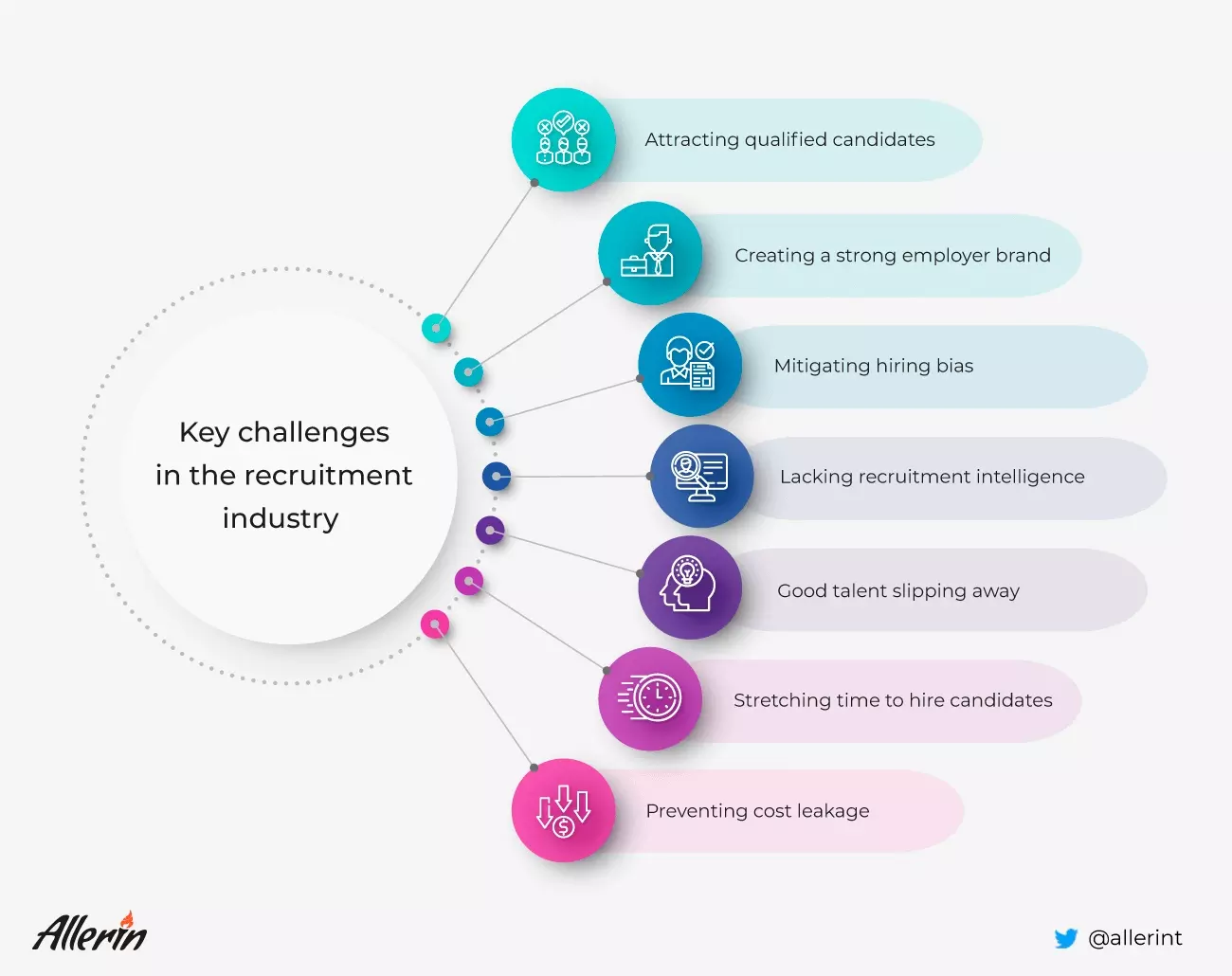It is important for recruiters to have information about the key challenges in the recruitment industry to be able to identify and solve them.
Recruiters have always been complaining that they cannot find the right talent for an open position. In 2018, 72.8% of surveyed recruiters said they were struggling to find the right talent. What if I say to you that not finding the right talent is the bare minimum challenge facing the recruitment industry? In fact, not finding the right talent is not even a challenge by itself, it is a result that is driven by various other challenges. Challenges such as attracting unqualified candidates, vague job descriptions, hiring biases, and losing good talent while interviewing, among others are some of the challenges that hold recruiters from finding the best fit for a job. We present you with a list of such challenges facing the recruitment sector.
7 Challenges in the Recruitment Industry
With an awareness of these challenges in the recruitment sector, recruiters and employers will be able to make strategies to tackle them and find the best talent for an open position with them.
1. Attracting Qualified Candidates
A job post can attract a huge number of candidates based on the platform used for posting. But it is not necessary that all the applicants are qualified for the job. To attract the most qualified candidates, recruiters need a strong job description. Wrong job descriptions can attract unqualified candidates along with qualified ones. A poorly crafted job description with irrelevant keywords can attract candidates with irrelevant skills. Let’s say a recruiter has published a job opening for a web developer and has added three keywords – ‘web developer’, ‘web development', and ‘data analysis’ - in it. The keywords ‘web developer’ and web development are relevant to the job opening but the third keyword, i.e., data analysis is not relevant to the job position. Therefore, the job opening will also attract data analysts along with web developers. Also, confusing titles can put the best talent off from applying to job openings. For instance, while looking for a bartender, if a bar uses the term barista, which is derived from an Italian word meaning bartender, in their job titles, not all the candidates would be able to find that the opening as they may be searching for bartender jobs. According to a survey conducted by Monster says 64% of candidates don’t apply for a job post with confusing titles. Hence, recruiters need strong job descriptions. But creating strong and precise job descriptions is challenging. That’s because a job seeker, on average, spends only 14 seconds to read a job description. Creating detailed and informative job descriptions that can convey all the necessary information within 14 seconds is challenging.
2. Creating a Strong Employer Brand
72% of hiring leaders believe that employer branding can have a significant impact on attracting and retaining the best talent. In fact, a Glassdoor survey shows that a company spends $129,000 on an average on employer branding. Despite all the investment and hard work recruiters put in, creating a strong employer brand is challenging. Creating a strong brand requires providing an enhanced experience to candidates, be it in terms of quick responses, ease in applying, or even onboarding. But several times, because of a huge number of applicants, recruiters are not able to provide necessary services to all candidates.
3. Preventing Good Talent Slipping Away
52% of recruiters agree that screening is the most challenging part of their job. Hence, to reduce the tedium in the screening process, a major percent of recruiters and employers use Applicant Tracking Systems (ATS). A study by Jobscan shows that 99% of Fortune 500 companies use ATS systems for recruitment. ATS systems automate the screening process to save a lot of time for recruiters. But the challenge with ATS systems is that they screen resumes based on keyword searches. Keyword-based screening can cost you your best candidate. There are chances that a candidate with poor resume writing skills but great technical skills required for the job is screened out because of ATS. Let’s consider an example to understand this well. Assume a Java developer has experience in working with Netbeans, which is a Java development platform. But due to a lack of resume writing skills, the candidate mentions only Netbeans development in the resume and doesn’t mention Java development. An ATS system looking for Java developer keyword will reject the application of the candidate as it has only Netbeans developer as a keyword. Hence, ATS systems can result in losing the good talent and leave you with less qualified candidates.
4. Finding Time to Hire Candidates
Time to hire a candidate can be calculated by subtracting the day a candidate entered the pipeline from the day the candidate accepted the offer. Time to hire = day candidate accepted an offer - day candidate entered the pipeline. Due to the increasing war of talent, the time to hire is increasing, and this stretched hiring process is a significant challenge in the hiring process. The stretched hiring process can cost you your best talent. Firstly, 57% of candidates lose interest in job openings if the hiring process is too long. Secondly, it takes around 27 days on average to hire a new candidate, but the best ones are off the market in just 10 days.
5. Overcoming Hiring Biases
Hiring bias or discrimination still remains a significant issue that can impact workplace diversity. That’s what a joint study by Harvard Business School, Stanford University, and the University of Toronto highlights. According to the study, only 11.5% of candidates receive an interview callback if they have Asian ethnicity or race reference in their resumes. It also points out that only 10% of African-American candidates get interview calls when reference to culture is left behind. When such discrimination is challenged, it can cost companies heavily. For instance, Google recently settled a long-running lawsuit claiming age discrimination for $11 million. Even if not challenged, bias can indirectly cost businesses. Bias can limit diversity in the workforce, which can impact overall productivity. For instance, companies with more gender diversity in their executive teams are 21% more likely to earn above-average profits. Not just limiting the workforce, bias can also lead to making wrong decisions while hiring. This can cost you a bad hire.
6. Stretching Time to Hire Candidates
It requires years of experience to learn the ropes to identify candidates’ skills and talent while interviewing. Recruiters with experience can determine a candidate’s soft skills such as confidence and personality by analyzing their behavior during interviews. But, the recruitment industry has a high staff turnover rate of 43%. Due to this high turnover rate, many recruiters lack recruitment intelligence. This lack of recruitment industry knowhow can result in making bad hiring decisions. Let’s say a company’s culture is open and requires a candidate that can easily adapt to its open culture. Due to a lack of recruitment intelligence, a recruiter might not be able to determine which candidate poses confidence and personality skills. This can lead to a bad hire that can cost organizations.
7. Preventing Cost Leakage
All the above-mentioned problems lead to bad hires, which continues to increase the cost leakage in the industry. Cost leakage is the difference between the cost to hire and the ROI the new employee can provide. Due to bad hires and the current talent war, the cost leakage in the recruitment industry is increasing at a rapid pace. Some estimates put the figures in the billions! Recruiters need to make sure that they avoid all the above-mentioned challenges and hire only the best talent for their job positions to reduce cost leakage.
All the challenges mentioned in this article, if not tackled properly, can cost organizations a fortune. You can leverage AI-driven recruitment intelligence to avoid such challenges and always find the best fits for your job positions. Recruitment intelligence has the potential to solve all the key challenges facing the recruitment sector. It can go beyond keywords to screen candidates and ensure that you have the best talent for interviews. Plus, it can assist recruiters in making hiring decisions. AI-based recruitment intelligence automates almost every task in the hiring process right from screening to selection. It also automates the response to candidates ensuring that they don’t have to wait long to hear back from you. With self-learning capabilities, recruitment intelligence can learn over time to write strong and precise job descriptions based on your company’s culture and job requirements.
There’s much more to how recruitment intelligence can help you avoid key challenges in the recruitment industry.




Leave your comments
Post comment as a guest